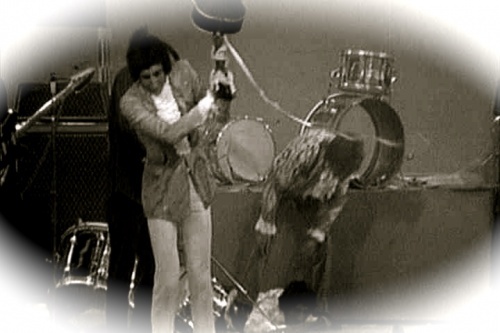
Is Apple and iTunes “digital vampire”? The Who's legendary guitarist Pete Townshend labeled Apple as digital vampire sucking royalties at expense of artists worldwide through iTunes while giving little back in promoting new content creativity:
---“"Is there really any good reason why, just because iTunes exists in the wild west internet land of Facebook and Twitter, it can't provide some aspect of these services to the artists whose work it bleeds like a digital vampire Northern Rock for its enormous commission?"---
Townshend proposed that Apple should help in the A&R process: by developing musicians by assisting in financial support, development, publishing, and marketing. While choking off the traditional music companies/record labels, Townshend suggests that Apple/iTunes has done little to fill the void. However, it is also fair to note that digital has spread the music, name and branding of artists beyond anything that traditional vinyl and CDs could ever do. Digital has made it more difficult to censor and restrict.
Cultural Bias:
Cultural exchange or diplomacy has also been facilitated. Artists are breaking through in both directions of cultural divides. That is good for art but perhaps also for cultural interaction. The artist, particularly musician is competing not so much against Apple as he is with a much broader range of fellow artists who can breakthrough the artificial veneer of old form record label promotions.
Cultural Diplomacy:
Undoubtedly Apple has benefitted immensely from the new model and iTunes. In fact my opinion is that Apple has made its big breakout in the technology universe on back of the halo encompassing the popularity and reach of iTunes. It does have responsibility toward music, art and the artists. However, it cannot simply go to the old record label model and promotions – nor what that even be necessarily good for art and new artists. The old model has its own prejudices and built-in preferences in terms of individuals, institutions and cultural perspectives.
“Diplomat” as Part of Definition of “Artist”:
The old model is fading away. Established mega-names, from U2 to The Who probably are transitioning the tectonic quake better than most, although they would have done much better if there was no fundamental shift. Nonetheless, the evolution is creating its own opportunities. Digital record sales may produce significantly lower royalty and publishing revenue shares but they have also enhanced the reach of the artist and his/her art. Pirating has also become a greater problem, but it always was. By lowering the cost of downloads, pirating of music is less of an economic incentive, and presumably that is a good thing, unless you claim a right to an absolute minimum for your recorded voice. Because of digital’s reach artists are increasingly broadening their brand, from film to direct involvement in business ventures bought in large part due to the artist’s celebrity rather than expertise or direct investment.
Part of the brave new world is the artists’ involvement in social responsibility efforts. There is no requirement that an artist be a spokesperson for a humanitarian cause or become a political activist. The “diplomat-artist” though is part of the halo of definition increasingly applicable. The reach of digital has made it more difficult to disassociate from the real world. That can be a source of artistic inspiration as well as a perceived obligation to engage of behalf of fellow man.
Placing Price on Art:
In this context, Townshend’s comments on his “inner songwriter” versus musician could be perceived as elitists. Speaking at the inaugural John Peel lecture in Manchester Townshend, The Who's chief songwriter offered: "I don't give a shit about making money. I think rock music is junk. I am a genius. The Who were OK but without me they would have all ended up working in the flower market, or worse - in Led Zeppelin."
Judging art can be even more complicated than giving it a price. Speaking just for myself, I respect and enjoy The Who’s music. I cannot give it a monetary value though beyond what I would and actually can pay. I respect John Townshend’s perspective, but I can better value an artist’s contribution as global-citizen. Some younger consumers of art claim that in the name of art, established musicians are protecting purely personal financial interests – and then also want to be judge by standards of artist rather than business
How do I value my work? - It is not about price paid but contemplation and discussion it might prompt, even intellectual or emotional satisfaction prompted, if I’m so fortunate.
READ – “Our Audiovisual Heritage” -http://diplomaticallyincorrect.org/films/blog_post/our-audiovisual-heritage-by-ambassador-mo/38370
By Ambassador Muhamed Sacirbey
Facebook – Become a Fan at “Diplomatically Incorrect”
Twitter – Follow us at DiplomaticallyX
“Diplomat Artist” Channel -
diplomaticallyincorrect.org/c/diplomat-artist

